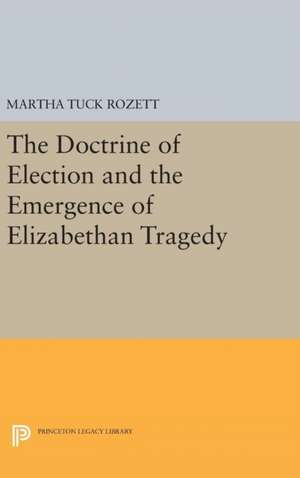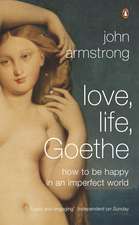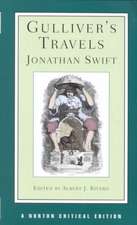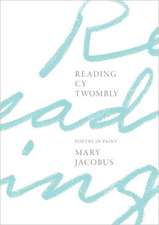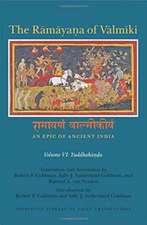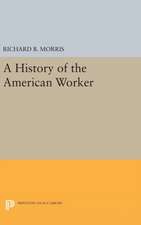The Doctrine of Election and the Emergence of Elizabethan Tragedy: Princeton Legacy Library
Autor Martha Tuck Rozetten Limba Engleză Hardback – 18 apr 2016
Originally published in 1984. The Princeton Legacy Library uses the latest print-on-demand technology to again make available previously out-of-print books from the distinguished backlist of Princeton University Press. These editions preserve the original texts of these important books while presenting them in durable paperback and hardcover editions. The goal of the Princeton Legacy Library is to vastly increase access to the rich scholarly heritage found in the thousands of books published by Princeton University Press since its founding in 1905.
| Toate formatele și edițiile | Preț | Express |
|---|---|---|
| Paperback (1) | 425.22 lei 6-8 săpt. | |
| Princeton University Press – 30 iun 2014 | 425.22 lei 6-8 săpt. | |
| Hardback (1) | 840.42 lei 6-8 săpt. | |
| Princeton University Press – 18 apr 2016 | 840.42 lei 6-8 săpt. |
Din seria Princeton Legacy Library
-
 Preț: 437.79 lei
Preț: 437.79 lei -
 Preț: 172.27 lei
Preț: 172.27 lei - 16%
 Preț: 683.63 lei
Preț: 683.63 lei - 16%
 Preț: 2324.11 lei
Preț: 2324.11 lei -
 Preț: 376.99 lei
Preț: 376.99 lei - 23%
 Preț: 780.26 lei
Preț: 780.26 lei -
 Preț: 377.31 lei
Preț: 377.31 lei -
 Preț: 313.18 lei
Preț: 313.18 lei - 16%
 Preț: 882.80 lei
Preț: 882.80 lei - 16%
 Preț: 736.40 lei
Preț: 736.40 lei - 16%
 Preț: 860.09 lei
Preț: 860.09 lei -
 Preț: 362.12 lei
Preț: 362.12 lei -
 Preț: 223.24 lei
Preț: 223.24 lei -
 Preț: 363.10 lei
Preț: 363.10 lei - 16%
 Preț: 915.48 lei
Preț: 915.48 lei -
 Preț: 340.22 lei
Preț: 340.22 lei - 16%
 Preț: 835.12 lei
Preț: 835.12 lei -
 Preț: 266.84 lei
Preț: 266.84 lei -
 Preț: 317.65 lei
Preț: 317.65 lei -
 Preț: 329.09 lei
Preț: 329.09 lei -
 Preț: 265.73 lei
Preț: 265.73 lei -
 Preț: 260.54 lei
Preț: 260.54 lei -
 Preț: 314.84 lei
Preț: 314.84 lei -
 Preț: 402.66 lei
Preț: 402.66 lei -
 Preț: 464.18 lei
Preț: 464.18 lei -
 Preț: 351.09 lei
Preț: 351.09 lei -
 Preț: 483.81 lei
Preț: 483.81 lei - 19%
 Preț: 500.29 lei
Preț: 500.29 lei -
 Preț: 388.44 lei
Preț: 388.44 lei -
 Preț: 328.48 lei
Preț: 328.48 lei - 23%
 Preț: 742.04 lei
Preț: 742.04 lei -
 Preț: 372.92 lei
Preț: 372.92 lei -
 Preț: 328.70 lei
Preț: 328.70 lei - 19%
 Preț: 505.89 lei
Preț: 505.89 lei -
 Preț: 446.25 lei
Preț: 446.25 lei -
 Preț: 289.17 lei
Preț: 289.17 lei - 19%
 Preț: 575.53 lei
Preț: 575.53 lei -
 Preț: 447.20 lei
Preț: 447.20 lei -
 Preț: 484.19 lei
Preț: 484.19 lei -
 Preț: 271.12 lei
Preț: 271.12 lei -
 Preț: 314.46 lei
Preț: 314.46 lei -
 Preț: 362.51 lei
Preț: 362.51 lei -
 Preț: 307.07 lei
Preț: 307.07 lei - 19%
 Preț: 498.46 lei
Preț: 498.46 lei -
 Preț: 272.27 lei
Preț: 272.27 lei - 19%
 Preț: 458.44 lei
Preț: 458.44 lei -
 Preț: 406.20 lei
Preț: 406.20 lei - 19%
 Preț: 515.73 lei
Preț: 515.73 lei -
 Preț: 428.88 lei
Preț: 428.88 lei -
 Preț: 369.27 lei
Preț: 369.27 lei
Preț: 840.42 lei
Preț vechi: 1091.45 lei
-23% Nou
Puncte Express: 1261
Preț estimativ în valută:
160.82€ • 169.11$ • 132.88£
160.82€ • 169.11$ • 132.88£
Carte tipărită la comandă
Livrare economică 17 aprilie-01 mai
Preluare comenzi: 021 569.72.76
Specificații
ISBN-13: 9780691640082
ISBN-10: 0691640084
Pagini: 342
Dimensiuni: 168 x 239 x 25 mm
Greutate: 0.65 kg
Editura: Princeton University Press
Seria Princeton Legacy Library
ISBN-10: 0691640084
Pagini: 342
Dimensiuni: 168 x 239 x 25 mm
Greutate: 0.65 kg
Editura: Princeton University Press
Seria Princeton Legacy Library
Descriere
This compelling argument for the link between Calvinism in English religious life and the rise of tragedy on the Elizabethan stage draws on a variety of material, including theological tracts, sermons, and dramatic works beginning with sixteenth-century morality plays and continuing through Marlowe's career and the beginning of Shakespeare's Origi
